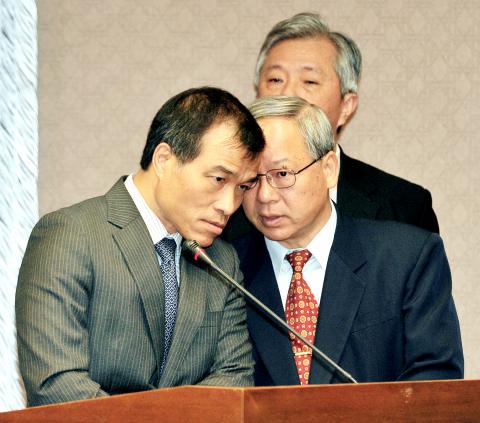The government is to step up security measures on railway systems by increasing the number of surveillance cameras on trains and possibly introducing passenger security checks, Minister of Transportation and Communications Yeh Kuang-shih (葉匡時) said yesterday.
Yeh made the comments during a legislative question-and-answer session that focused on an incident on Friday in which homemade explosive devices were found in suitcases in a restroom on a Taiwan High Speed Rail (THSR) train.
About three hours after the two suitcases containing explosive devices and gasoline were discovered on the train, two similar bombs were found in front of the office of Chinese Nationalist Party (KMT) Legislator Lu Chia-chen (盧嘉辰) in New Taipei City (新北市).

Photo: Chien Jung-fong, Taipei Times
Lu said it was the most serious security incident in the nation’s transportation history.
Democratic Progressive Party (DPP) Legislator Lee Kun-tse (李昆澤) said that if an explosion occurred on a fully-loaded train traveling at a speed of almost 300kph it could cost about 1,000 lives.
He said the government should strengthen police patrols, improve and increase surveillance and monitoring systems and hold regular security drills.
In response, Yeh said that because the police force does not have sufficient manpower, more security guards would be employed to strengthen security at THSR and Taiwan Railways Administration stations.
Since subway systems fall under the jurisdiction of local governments, the Ministry of Transportation and Communications would also coordinate with local governments to increase the number of security personnel in subway systems within a month, Yeh added.
On the issue of passenger security checks, Yeh said that China is the only country in the world that employs this measure.
However, “we could consider doing the same,” Yeh said, adding that the ministry would study the feasibility of installing X-ray scanners at every station along railway lines and would come up with a report in a month’s time.
The Bureau of High Speed Rail is considering installing surveillance systems in trains’ luggage areas and at its stations’ entrances and exits, bureau Director-General Chu Shu (朱樹) said.
However, it is unlikely that surveillance systems will be installed in train carriages, in consideration of personal privacy and also because new surveillance systems are not compatible with the old train carriages, he said.

Alain Robert, known as the "French Spider-Man," praised Alex Honnold as exceptionally well-prepared after the US climber completed a free solo ascent of Taipei 101 yesterday. Robert said Honnold's ascent of the 508m-tall skyscraper in just more than one-and-a-half hours without using safety ropes or equipment was a remarkable achievement. "This is my life," he said in an interview conducted in French, adding that he liked the feeling of being "on the edge of danger." The 63-year-old Frenchman climbed Taipei 101 using ropes in December 2004, taking about four hours to reach the top. On a one-to-10 scale of difficulty, Robert said Taipei 101

Nipah virus infection is to be officially listed as a category 5 notifiable infectious disease in Taiwan in March, while clinical treatment guidelines are being formulated, the Centers for Disease Control (CDC) said yesterday. With Nipah infections being reported in other countries and considering its relatively high fatality rate, the centers on Jan. 16 announced that it would be listed as a notifiable infectious disease to bolster the nation’s systematic early warning system and increase public awareness, the CDC said. Bangladesh reported four fatal cases last year in separate districts, with three linked to raw date palm sap consumption, CDC Epidemic Intelligence

Taiwanese and US defense groups are collaborating to introduce deployable, semi-autonomous manufacturing systems for drones and components in a boost to the nation’s supply chain resilience. Taiwan’s G-Tech Optroelectronics Corp subsidiary GTOC and the US’ Aerkomm Inc on Friday announced an agreement with fellow US-based Firestorm Lab to adopt the latter’s xCell, a technology featuring 3D printers fitted in 6.1m container units. The systems enable aerial platforms and parts to be produced in high volumes from dispersed nodes capable of rapid redeployment, to minimize the risk of enemy strikes and to meet field requirements, they said. Firestorm chief technology officer Ian Muceus said

MORE FALL: An investigation into one of Xi’s key cronies, part of a broader ‘anti-corruption’ drive, indicates that he might have a deep distrust in the military, an expert said China’s latest military purge underscores systemic risks in its shift from collective leadership to sole rule under Chinese President Xi Jinping (習近平), and could disrupt its chain of command and military capabilities, a national security official said yesterday. If decisionmaking within the Chinese Communist Party has become “irrational” under one-man rule, the Taiwan Strait and the regional situation must be approached with extreme caution, given unforeseen risks, they added. The anonymous official made the remarks as China’s Central Military Commission Vice Chairman Zhang Youxia (張又俠) and Joint Staff Department Chief of Staff Liu Zhenli (劉振立) were reportedly being investigated for suspected “serious